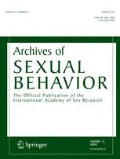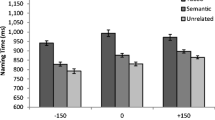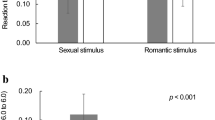Abstract
Seventy-three men and 72 women made lexical decisions to target words that followed sentences constructed so that the last word was a sexual double-entendre. Prime target relatedness, erotic versus nonerotic target, stimulus onset asynchrony, and participant's gender were varied in a between-subjects design. A second analysis that substituted sentence context for prime target relationship also was conducted. Data were collected on the emotionality and social acceptability of priming sentences and target words. Results revealed that, as with previous research on neutral words, prime target relatedness facilitated lexical decisions. Additionally, there was evidence of slowing in making lexical decisions when erotic material was presented or was part of a contextual bias. This delay was accentuated in women. A model that proposes that sexual words evoke a more complex processing sequence is presented. The model suggests that appraisal and checking or editing mechanisms, which are accentuated in women, help explain the phenomenon.
Similar content being viewed by others
REFERENCES
Dixon, N. F. (1980). Preconscious Processing, Wiley, New York.
Erdelyi, M. H. (1974). A new look at the new look: Perceptual defense and vigilance. Psychol. Rev. 81: 1–25.
Everaerd, W., and Geer, J. H. (1992, June). Theory development in sexuality. Paper presented at the International Academy of Sex Research meetings, Prague, Czechoslovakia.
Forster, K., and Bednall, E. S. (1976); Terminating and exhaustive search in lexical access. Memory Cognit. 4, 53–61.
Frijda, N. H. (1993). The place of appraisal in emotion. Cognit. Emot. 7: 357–387.
Galbraith, G. G. (1968). Effects of sexual arousal and guilt on free associative sexual responses. J. Consult. Clin. Psychol. 32: 193–197.
Galbraith, G. G., and Mosher, D. L. (1968). Associative sexual response in relation to sexual arousal, guilt, and external approval contingencies. J. Pers. Soc. Psychol. 10: 142–147.
Geer, J. H. (1996). Gender differences in the organization of sexual information. Arch. Sex. Behav. 25: 91–107.
Geer, J. H., and Bellard, H. S. (1996). Sexual content induced delays in lexical decisions: Gender and context effects. Arch. Sex. Behav. 25: 379–395.
Geer, J. H., Judice, S. L., and Jackson, S. R. (1994). Reading times of erotic material: The pause to reflect. J. Gen. Psychol. 121: 345–352.
Geer, J. H., and Lapour, K. (1990, June). The sexes differ in their processing of erotic romantic, and neutral sentences. Poster presented at the American Psychological Society Meetings, Dallas, Texas.
Geer, J. H., Lapour, K. J., and Jackson, S. R. (1993). The information processing approach to human sexuality. In Birbaumer, N., and Ohman, A. (eds.), The Structure of Emotion: Psychophysiological, Cognitive and Clinical Aspects, Hogrefe-Huber, Toronto, pp. 139–155.
Geer, J. H., and McGlone, M. S. (1990). Sex differences in memory for erotica. Cognit. Emot. 4: 71–78.
Green, D. M., and Swets, J. A. (1966). Signal Detection Theory and Psychophysics, Wiley, New York.
Hogaboam, T. W., and Perfetti, C. A. (1975). Lexical ambiguity and sentence comprehension. J. Verbal Learning Verbal Behav. 12: 577–589.
Jay, T. B. (1980). Sex roles and dirty words usage: A review of the literature and a reply to Haas. Psychol. Bull. 88: 614–621.
Kerr, B. J., and Galbraith, G. G. (1975). Latencies of sexual and asexual responses to double entendre words as a function of sex-guilt and social desirability in college females. Psychol. Rep. 37: 991–997.
Kitayama, S. (1991). Impairment of perception by positive and negative affect. Cognit. Emot. 5: 255–274.
MacKinnon, C. A. (1987). A feminist/political approach. In Geer, J. H., and O'Donohue, W. T. (eds.), Theories of Human Sexuality, Plenum Press, New York, pp. 65–90.
Macleod, C., Mathews, A., and Tata, P. (1986). Attentional bias in emotional disorders. J. Abn. Psychol. 95: 15–20.
Marascuilo, L., and Serlin, R. (1988). Statistical Methods for the Social and Behavioral Sciences, W. H. Freeman, New York.
Mistler-Lachman, J. L. (1972). Levels of comprehension in processing of normal and ambiguous sentences. J. Verbal Learning Verbal Behav. 11.
Mosher, D. L. (1961). The development and validation of a sentence completion measure of sex guilt. Unpublished doctoral dissertation, Ohio State University.
Mosher, D. L. (1965). Interaction of fear and guilt in inhibiting unacceptable behavior. J. Consult. Clin. Psychol. 29: 161–167.
Motley, M., Camden, C., and Baars, B. (1982). Covert formulation and editing of anomalies in speech production: Evidence from experimentally elicited slips of the tongue. J. Verbal Learning Verbal Behav. 21: 570–596.
Neely, J. H. (1991). Semantic priming effects in visual word recognition: A selective review of current findings and theories. In Besner, D., and Humphreys, G. (eds.), Basic Processes in Reading: Visual Word Recognition, Erlbaum, Hillsdale, NJ, pp. 264–336.
Olson, J., and MacKay, D. (1974). Completion and verification of ambiguous sentences. J. Verbal Learning Verbal Behav. 13: 457–470.
Onifer, W., and A Swinney, D. A. (1981). Accessing lexical ambiguities during sentence comprehension: Effects of frequency of meaning and contextual bias. Memory Cognit. 9: 225–236.
Posner, M. I., and Snyder, C. R. R. (1975). Attention and cognitive control. In Solso, R. L. (ed.), Information Processing and Cognition: The Loyola Symposium, Erlbaum, Hillsdale, NJ, pp. 55–85.
Rayner, K., and Duffy, S. A. (1986). Lexical Complexity and fixation times in reading: Effects of word frequency, verb complexity, and lexical ambiguity. Memory Cognit. 14: 191–201.
Schvaneveldt, R. W., Meyer, D. E., and Becker, C. A. (1976). Lexical ambiguity, semantic context, and visual word recognition. J. Exp. Psychol. Hum. Percept. Perform. 2: 243–256.
Schwartz, S. (1975). Effects of sex guilt on word association responses to double entendre sexual words. J. Consult. Clin. Psychol. 43: 100.
Seidenberg, M. S., Tanenhaus, M. K., Leiman, J. M., and Bienkowski, M. (1982). Automatic access of the meanings of ambiguous words in context: Some limitations of knowledge-based processing. Cognit. Psychol. 14: 489–537.
Simpson, G. B. (1981). Meaning dominance and semantic context in the processing of lexical ambiguity. J. Verbal Learning Verbal Behav. 20: 120–136.
Simpson, G. B., and Burgess, C. (1982, November). Processing Lexical Ambiguity: A chronometric analysis. Paper presented at the annual meeting of the Psychonomic Society, Minneapolis, MN.
Sneider, W. (1988). Micro Experimental Laboratory: An integrated system for IBM PC compatables. Behav. Res. Meth. Instr. Comput. 20: 206–217.
Tanenhaus, M., Leiman, J., and Seidenberg, M. (1979). Evidence for multiple stages in the processing of ambiguous words in syntactic contexts. J. Verbal Learning Verbal Behav. 18: 427–440.
Webster's Third New International Dictionary of the English Language, Unabridged. (1971). Editor-in-Chief: Philip Babcock Gove and the Merriam Webster Editorial Staff, Merriam, Springfield, MA.
Author information
Authors and Affiliations
Additional information
Portions of this work was submitted by the junior author in partial fulfillment of the requirements for Honors in Psychology at Louisiana State University
Rights and permissions
About this article
Cite this article
Geer, J.H., Melton, J.S. Sexual Content-Induced Delay With Double-Entendre Words. Arch Sex Behav 26, 295–316 (1997). https://doi.org/10.1023/A:1024574915201
Issue Date:
DOI: https://doi.org/10.1023/A:1024574915201




